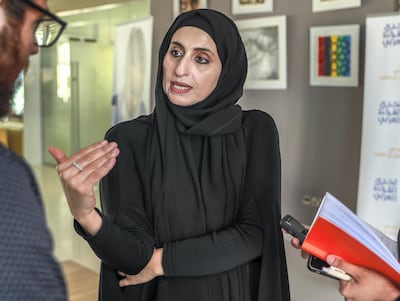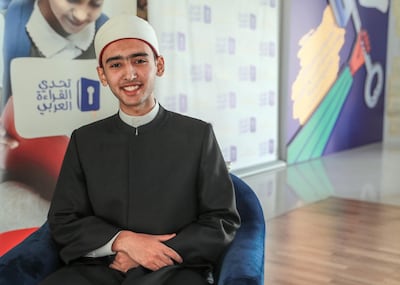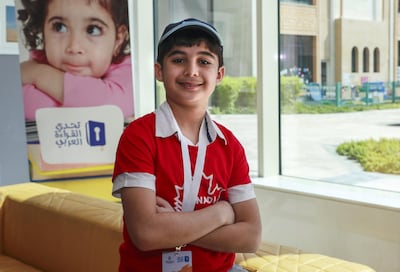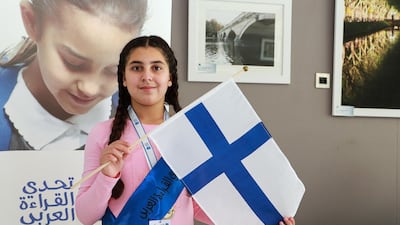Young literature lovers have come together to celebrate their appreciation of the Arabic language — and help make an ambitious UAE education initiative a global success.
The Arab Reading Challenge, launched by Sheikh Mohammed bin Rashid, Vice President and Ruler of Dubai, in 2015, has attracted more than 10 million entrants from across the planet, now whittled down to a final five.
The challenge aims to establish a culture of reading among young Arabs worldwide.
With this year's event proving to be the biggest yet, organisers at the Mohammed bin Rashid Al Maktoum Global Initiatives foundation have their sights set on making the next generation of Arab readers "the best in the world".
Participants — who must be between 8 and 18 — were set the challenge of reading a minimum of 50 books in Arabic over the course of one academic year, before being tested on their understanding of the texts during the competition.
The semi-finals of the competition, featuring 44 bookworms, were recently held at the School of Research Science in Al Warqa, Dubai.
Children from across the Middle East displayed their passion for prose alongside Arab-speakers from countries such as China, Finland and Canada.
Winning prizes total Dh11 million, including a cool Dh500,000 for the overall winner. The outstanding school will scoop Dh1 million, with the best supervisor walking away with Dh300,000.
Even for those who don't secure prizes, the event provides an enriching experience and is helping the Arab language to thrive.
“It’s important that the children read between the lines and understand,” said Prof El Tayeb Abusin, a member of the judging panel.
“This is helping to bring together the Arab community from different parts of the world. The language is the strongest link between the nations. We have to pass on this language to the next generation.”

Najla Al Shamsi, Secretary General of the Arab Reading Challenge, said this year's event has highlighted the strength of the Arab language worldwide.
“The competition seeks to spark an Arab knowledge and scientific renaissance through opening the Arab world to global knowledge resources, broadening its horizons, and enabling convergence between ideas, values and experiences through promoting active reading habits,” she said.
"We have a very rich history and we need to ensure that the next generations are the best readers in the world. We are working towards this goal now.
“The Arabic language is a nation by itself. Those people who left their countries, left for socio-economic reasons and they still have an emotional connection with their countries which is reflected by the Arabic language.”

One of the semi-finalists, Khalil Bioumy, an Egyptian pupil, 16, said he wanted to participate in the challenge because he is passionate about reading Arabic books.
He read more than 200 books in the last year.
"For the last seven months I read between five to seven hours daily. If I win, I would like to encourage others to read and participate in the competition,” he said.
________
Read more:
Voting begins for Arab Reading Challenge's best school
Summer Reading Challenge: Could your child read 30 books this summer?
________
Ahmad Dakouri, a Syrian-Canadian, 10, read more than 100 books in the past year in preparation for the contest.
Encouraged by his siblings and his family, he said would come home from school and read every day for many hours.
“My family encourages me because they know that I read a lot in Arabic,” he said.
“Reading in Arabic is special for me. It is different because it gives me more knowledge and understanding of things. For example I can translate into Arabic.
“If I win, I would like to buy medicine for my grandmother who has diabetes.
"I would like to be a scientist and a doctor so I can invent a new medicine to cure diabetes to help my grandmother.”

Majd Ahmad Majid, 11, an Iraqi living in Finland, said reading has helped shape her personality.
The youngster also speaks German, English and Finnish as well as Arabic and has big ambitions for her future.
She read 118 books for the competition and said and she will continue reading in Arabic.
“I dream of becoming a president. Arabic will help me in this goal. For the books I love, Arabic is different and more expressive than other languages,” she said.
The finalists will compete for the title of Champion of the Arab Challenge to be announced at a ceremony on Tuesday at Dubai Opera.


